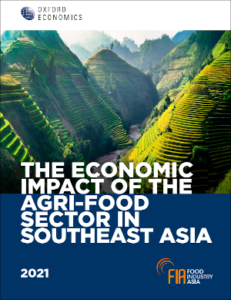Economic Impact | 22 Jun 2021
The Economic Impact of the Agri-Food Sector in Southeast Asia

A comprehensive study of the economic impact of Southeast Asia’s Agri-food sector in 2019, with deeper analysis into the impact of the COVID-19 pandemic and the policy challenges faced by the sector in the years ahead.
In 2019, the agri-food sector supported over 40% of jobs in Vietnam, Indonesia, Thailand, and the Philippines; as well as 28% of total tax revenues across the four countries.
Across the Southeast Asian region, the agri-food sector has always played a critical role in supporting the livelihoods of people: from putting food on millions of tables, to supporting local governments via tax revenues. The sector demonstrated its resilience in 2020, despite the effects of COVID-19 on travel, trade, and business operations.
However, the agri-food sector faces more challenges in the years ahead, including risks to food supply and demand, and the spectre of new public spending and taxation policies in the post-COVID recovery.
To help anticipate these risks, Oxford Economics worked with Food Industry Asia (FIA) to define and quantify the sector’s total economic impact in four major Southeast Asian economies (Indonesia, Thailand, Vietnam, and the Philippines). Our analysis spans the full range of agri-food activity, from farm-to-fork. That includes agricultural production; food and beverage manufacturing; and food and beverage distribution.
We used the Oxford Economics Global Economic Impact Model and official statistics from national databases to quantify the direct impact of the agri-food sector on GDP and employment; the indirect economic impact from supply chain spending; and the induced economic impact from consumer spending by wage earners in the sector. Finally, we developed a Fiscal Risk Framework to forecast the potential risks countries may face due to potential contractionary fiscal measures.
We found that the agri-food sector contributed USD 717 billion and supported 127 million jobs across the four Southeast Asian economies in 2019. The sector weathered the COVID-19 pandemic well during 2020. In Indonesia and Vietnam, its economic footprint grew by 2% and 4%, respectively, in real terms compared to the year before. In Thailand and the Philippines, the sector’s total economic contribution shrank, but by less than the fall in GDP, revealing the essential nature of agri-food production and distribution. The report delves into the deeper implications and economic risks each country’s agri-food sector faces in the post-COVID recovery.
 With this research, Oxford Economics helped Food Industry Asia articulate the economic importance of the sector and the policy risks its members face in the years ahead, to advocate for smart policy solutions in the challenging post-COVID-19 environment.
With this research, Oxford Economics helped Food Industry Asia articulate the economic importance of the sector and the policy risks its members face in the years ahead, to advocate for smart policy solutions in the challenging post-COVID-19 environment.
Our economic consulting team are world leaders in quantitative economic analysis, working with clients around the globe and across sectors to build models, forecast markets and evaluate interventions using state-of-the art techniques. Lead consultants on this project were:
To find out more about our capabilities, contact:
EMEA
Sam Moore
+44 (0)207 803 1415
Email
Americas
Diantha Redd
+1 (646) 384 0271
Email
Asia
James Lambert
+44 (0)203 910 8065
Email
Related Services

Post
Global Trade Education: The role of private philanthropy
Global trade can amplify economic development and poverty alleviation. Capable leaders are required to put in place enabling conditions for trade, but currently these skills are underprovided in developing countries. For philanthropists, investing in trade leadership talent through graduate-level scholarships is an opportunity to make meaningful contributions that can multiply and sustain global economic development.
Find Out More
Post
Mapping the Plastics Value Chain: A framework to understand the socio-economic impacts of a production cap on virgin plastics
The International Council of Chemical Associations (ICCA) commissioned Oxford Economics to undertake a research program to explore the socio-economic and environmental implications of policy interventions that could be used to reduce plastic pollution, with a focus on a global production cap on primary plastic polymers.
Find Out More
Post
The Economic Contribution of Mexico’s Audiovisual Industry
This report demonstrates the integral role that the AV industry plays in Mexico's economy by estimating the industry’s domestic economic footprint. The analysis comprises all aspects of the audiovisual industry, including film production, distribution, and exhibition; the production, distribution, and broadcast of television content on free-to-air and pay TV channels; and online video platforms. Our estimates provide a recent snapshot of the audiovisual industry, including impacts at the broader industry level and broken out by sub-sector.
Find Out More